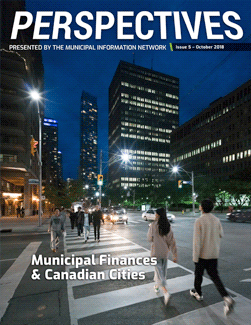Editor's Note: Following is the Executive Summary of a 2016 report prepared by Drs Harry Kitchen and Enid Slack concerning alternative revenue opportunities for Canadian cities. It is an important, independent analysis of the key issues that plague Canadian municipalities today—new revenue opportunities and changing how our local governments are financed. The article provides important context for this larger debate on new local government revenues. This summary is re-printed with permission by the authors.
Canadian cities face many challenges - changing demographics, increased income inequality, increasingly complex expenditure demands, deteriorating infrastructure, and so on. These challenges have increased over the last few decades, yet the revenues available to cities to meet those challenges have remained largely the same - property taxes, user fees, and transfers from federal and provincial governments.
For a long time, Canadian cities have been calling for access to more taxes, comparable with what large U.S. and European cities have. This article argues that additional taxes are entirely appropriate for major cities and estimates the potential revenue that some of these taxes could generate in eight Canadian cities - Vancouver, Calgary, Edmonton, Winnipeg, Toronto, Ottawa, Montréal, and Halifax.
First, however, the paper sets out a framework for analysing appropriate tax revenues for large cities and evaluates the advantages and disadvantages of each. The findings from this research are as follows:
- Decisions on public spending need to be linked with revenue decisions. For governments to operate efficiently, it is important that a clear link be established between expenditure and revenue decisions - those who make expenditure decisions should also make revenue decisions and the revenue tool should match the type of expenditure being funded. A direct link such as this should result in more accountable government and in greater willingness on the part of taxpayers to pay taxes, as long as they know where their tax dollars are being spent.
- The property tax is a good tax for local government. The property tax has many of the characteristics of a good local tax - property is immovable so it cannot escape the tax, it is fair based on the benefits received from local government services, and revenues are stable and predictable. Recent evidence suggests that, in many cities, there is room to increase the residential property tax without dire economic consequences, except for those who may be asset-rich but income-poor. Even so, the property tax may not be sufficient to meet the growing needs of large cities.
- User fees bring in necessary revenues and play an important role in altering economic decisions. Cities should charge for services wherever possible. Properly designed fees enable citizens to make efficient decisions about how much of a service to consume and governments to make efficient decisions about how much of the service to provide. Under-pricing (or failing to charge for) services leads to over-consumption and demands to build more under-priced infrastructure.
- Cities would benefit from a mix of taxes. The property tax is a good tax for local governments, but it is relatively inelastic (does not grow automatically as the economy grows), highly visible, and politically contentious almost everywhere. It is thus unlikely to be sufficient to fund the complex and increasing demands of local governments and it may not be the appropriate tax to fund some of these services. A mix of taxes would give cities more flexibility to respond to local conditions such as changes in the economy, evolving demographics and expenditure needs, changes in the political climate, and other factors. A portfolio of taxes would allow cities to achieve revenue growth and revenue stability while ensuring fairness in the impact on taxpayers.
- Personal income taxes have the potential to generate considerable revenue for large cities. Many cities around the world have access to revenues from sources such as income, sales, hotel, fuel, and motor vehicle taxes. For Canadian cities, personal income taxes have the potential to bring in a significant amount of revenue. For small and medium-sized municipalities, however, new taxes may not be appropriate because they may not generate sufficient revenues to justify the tax. Smaller municipalities may have to rely more heavily on transfers from provincial governments than their larger city counterparts.
- Cities should set their own tax rates. It would be administratively cost-efficient if cities "piggybacked" new taxes on to the provincial tax with the province collecting the revenue and remitting it to cities. It is critical, however, that local governments set their own tax rate.
To read the entire report, go to
https://tspace.library.utoronto.ca/bitstream/1807/82858/1/imfg_perspectives_no15_newtaxsources_kitchen_slack_2016.pdf





